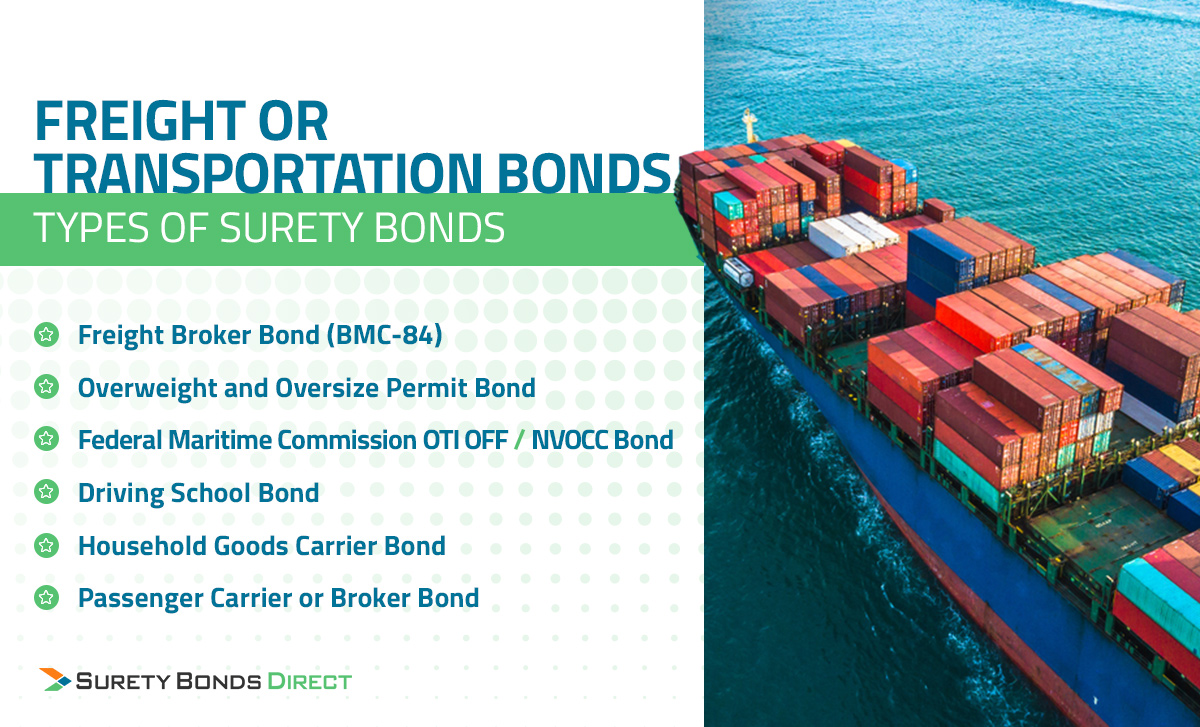4 of the Biggest Industries That Require Surety Bonds
In many U.S. states, everyone from auto dealers to construction contractors, among many others, are required to obtain surety bonds. Which are the major industries that most frequently require surety bonds?

Businesses in any industry must comply with a variety of rules and regulations to obtain licensure and accept contracts. From tax laws to safety regulations, every business must be aware of the relevant rules specific to the industry in which they operate. Surety bond requirements are one common type of requirement in many industries.
Surety bonds help protect a business’s customers, suppliers and various state and local agencies by providing a legally binding financial guarantee for the business’s obligations. In many U.S. states, everyone from auto dealers to construction contractors, among many others, are required to obtain surety bonds. Which are the major industries that most frequently require surety bonds? Below, we’ll talk about four of them and the types of surety bonds that businesses in these industries may need.
What Is a Surety Bond?
Surety bonds are three-party agreements that provide a binding financial guarantee. One party called the principal will obtain the bond to guarantee their obligation to another party called the obligee. The obligee typically requires the bond as a condition for executing a contract with or issuing a license to the principal. Those obligations might include completing a contract on time, and to a certain standard of quality, and obeying the laws and ethical standards of their profession.
The party that provides the guarantee is a neutral third party called a surety. The surety agrees that it will provide financial redress to the obligee—and sometimes to another claimant—should the principal break the terms specified in the bond and be unwilling or unable to provide redress themselves. Each surety bond includes a specific bond coverage amount, also known as the penalty sum, that establishes the maximum amount that the surety will pay.

Note that if the surety pays a claim to an obligee or claimant, the principal is ultimately responsible for paying back the surety for the full amount paid out. Thus, although surety bonds are often regulated and referred to as an insurance product, they are more similar to lines of credit. A principal applying for a surety bond will often, though not always, have to go through an underwriting process—including a credit check—before a bond producer will issue a bond.
For more information about how surety bonds work, see our article on What Is a Surety Bond? Next, we’ll discuss the major industries that most commonly require surety bonds.
Four Major Industries That Often Require Surety Bonds
Most of the industries below require surety bonds as part of the application process for state licensure in that industry. The requirement is most common in industries that involve large financial transactions, complex laws, and/or substantial responsibility for clients’ wealth and property. Because most of these types of surety bonds are required at the state level, rules vary widely by state, so businesses should always be sure to check their state’s specific regulations.
-
Motor Vehicle Dealer and DMV Bonds

Types of Motor Vehicle Surety Bonds for Professional Licenses:
- Motor Vehicle Dealer Bond: These surety bonds, sometimes called auto bonds, guarantee that an auto dealer will follow the law. They protect a motor vehicle dealer’s customers and creditors from fraudulent or unethical conduct by the dealer, such as misrepresenting a vehicle’s condition or selling stolen vehicles. In most states, an auto dealer must obtain a motor vehicle dealer bond before they can receive an auto dealer license from their state government.
- Yacht Broker Bond or Yacht Salesperson Bond: These surety bonds guarantee that a yacht broker or yacht salesperson will obey the law and operate their business ethically. They serve a similar purpose as motor vehicle dealer bonds but apply to the yacht sales industry instead.
- Motor Vehicle Registration or Title Service Bond: These surety bonds guarantee the legal and ethical conduct of title services and other businesses licensed to perform DMV functions. Many state DMVs contract private businesses to perform administrative functions, such as vehicle registration processing and title transfers, and these businesses must obtain surety bonds to become licensed.
- Manufactured Housing Bonds and Manufactured Housing Installer Bonds: These surety bonds guarantee that businesses that sell and/or install manufactured homes will follow state laws and not use harmful or fraudulent practices. Many states require them as a condition of licensure for manufactured home businesses.
Motor Vehicle Surety Bonds for Consumers:
- Certificate of Title Bond: These surety bonds, also known as "title bonds," "bonded titles," or "defective title bonds," guarantee the legal validity and ownership of a vehicle’s title. A bonded title is usually required as a condition for registering a vehicle with the DMV when the vehicle’s original title has been lost, stolen, or destroyed. The bond amount will vary according to the vehicle’s appraised value. These titles are typically bought by private auto owners rather than motor vehicle dealers.
-
Construction Contractor License, Project, or Permit Bonds

Types of Contractor License Surety Bonds:
- Contractor License Bond: These surety bonds guarantee that a construction contractor will obey all relevant laws and will honor their contracts with their clients. Required penalty sums for a contractor bond vary widely by state, and different types of contractors such as residential, commercial, or specialty will often have different penalty sum requirements as well.
- Financially Responsible Officer Bond: These surety bonds guarantee the ethical conduct of a company’s financially responsible officer (FRO), a person with the responsibility to ensure the accuracy and compliance of a business’s accounting. Only a small handful of states require these surety bonds, and they’re only required for certain business arrangements that are found largely within the construction industry.
Types of Contractor Project-Based Surety Bonds:
- Contract/Construction Bond: These surety bonds guarantee that a contractor will fulfill various specific obligations, such as paying subcontractors and suppliers or repairing errors in workmanship discovered after the completion of a project. This is a wide-ranging category of surety bonds that many construction contractors must obtain before accepting a contract—or, in the case of a bid bond, before entering an RFP bid—including:
- Permit or Right of Way Bond: These surety bonds guarantee that a construction contractor hired to perform work on a public right of way, such as a street or highway, will obey all relevant local laws and rules. Most local governments will require contractors to obtain these bonds before accepting a contract to perform work on a public right of way.
- Farm Labor Contractor Bond: These surety bonds guarantee that an employer who hires foreign agricultural laborers through the H-2A visa program will follow the numerous laws that accompany this program. Required penalty sums vary according to the number of H-2A laborers that the business employs.
-
Freight or Transportation Bonds

Types of Freight and Transportation License Surety Bonds:
- Freight Broker Bond (BMC-84): These surety bonds guarantee that a freight broker business will fulfill its contracts and operate according to all applicable laws. BMC-84 freight broker surety bonds are an essential part of how to become a freight broker and are required for getting a freight broker license from the FMCSA. All BMC-84 bonds have the same penalty sum of $75,000, and they are often a more cost-effective and business-friendly alternative to establishing a BMC-85 trust fund.
- Overweight and Oversize Permit Bond: These surety bonds guarantee that freight carriers who haul freight over a certain size or gross weight will comply with all applicable regulations, pay required highway use tax, and pay for any damage caused to streets and highways. They are typically required as part of the application process for an oversized load permit.
- Federal Maritime Commission OTI OFF/NVOCC Bond: These surety bonds guarantee ethical and legal conduct and contract fulfillment by a certain class of marine freight shippers called ocean transportation intermediaries (OTIs). This includes ocean freight forwarders (OFFs) and non-vessel operating common carriers (NVOCCs). The required penalty sum for the surety bond is the same in every state, but varies by the type of business and whether the business is domiciled in the U.S.
- Driving School Bond: These surety bonds guarantee that schools that provide driver education—for normal drivers, commercial drivers, or both—will operate according to the law. Some states’ driving school surety bonds also guarantee the return of customers’ tuition if the school closes before providing services paid for.
- Household Goods Carrier Bond or Passenger Carrier or Broker Bond: These surety bonds guarantee that residential moving services and group passenger transportation services will fulfill contracts faithfully and operate legally.
- IFTA Bond: These surety bonds guarantee state fuel tax payments per the International Fuel Tax Agreement. The bond ensures compliance with state laws and payment of any monies to state regulatory authorities.
-
Mortgage, Finance, Insurance, or Tax License Bonds

Types of Mortgage Surety Bonds:
- Mortgage Broker, Lender, or Originator Bond: These surety bonds guarantee that mortgage professionals will obey the law and not engage in fraudulent or unethical conduct that harms their clients. This type of bond can cover many different types of mortgage professionals depending on the state in which it’s issued, including mortgage brokers, loan originators, and loan servicers.
Types of Finance Surety Bonds:
- Collection Agency Bond: These surety bonds guarantee that debt collection services will not conduct themselves fraudulently, dishonestly, or in violation of debt collection laws.
- Investment Advisor/Broker-Dealer Bond: These surety bonds guarantee the ethical and legal conduct of professionals who provide investment advice, financial planning, and/or handle securities for their clients. In particular, they guard against the violation of fiduciary duties and misuse of client funds.
- Credit Services Organization Bond: These surety bonds guarantee that organizations that help people improve their credit won’t engage in illegal or dishonest practices such as misrepresenting their services or using fraudulent means to improve credit scores.
- Appraisal Management Company (AMC) Bond: These surety bonds guarantee that businesses that provide third party management of networks of real estate appraisers will not engage in illegal or unethical conduct.
- Loan Broker Bond: These surety bonds guarantee that loan brokers and other financial services organizations that help borrowers secure loans will conduct their business lawfully and honestly.
- Finance Lender or Broker Bond: These surety bonds guarantee that finance lenders who make certain types of loans will operate in compliance with ethical and legal standards. This type of surety bond is a specialized type of Loan Broker Bond required primarily in the state of California.
- Lost Security Bond: These surety bonds guarantee the ownership and legality of financial instrument certificates, such as cashier’s checks, stock certificates, and bond certificates. Financial institutions require lost security bonds when the original certificate has been lost, destroyed, or stolen. Lost security bonds come in two main types: fixed penalty bonds for items with a fixed value, such as cashier’s checks, and open penalty bonds for items with fluctuating value, such as stock certificates.

Types of Tax Professional Surety Bonds:
- Tax Preparer Bond: These surety bonds guarantee that paid professional tax preparers will perform their duties in compliance with all relevant legal and ethical standards. Relatively few states require tax preparer surety bonds.
- Legal Document Assistant Bond: These surety bonds guarantee that paid legal document preparers will comply with rules, laws, and ethical standards in the performance of their duties. Like tax preparer bonds, they are only required in a few states.
Types of Insurance Surety Bonds:
- Insurance Broker and Agent Bond: These surety bonds guarantee that insurance brokers and agents won’t commit negligence or malfeasance in their dealings with clients.
- Public or Independent Adjuster Bond: These surety bonds guarantee that a public insurance adjuster will operate ethically and obey all relevant aspects of the state insurance code.
- Title Insurance Agency Bond: These surety bonds guarantee that real estate title insurance agencies will follow the law and execute their duties faithfully to all parties—usually mortgage lenders or property owners—that they insure.
- Surplus Lines Broker Bond: These surety bonds guarantee that insurance brokers who are authorized to sell surplus lines insurance—insurance from non-admitted insurers that specialize in substandard or unusual risk. A surplus lines broker bond is particularly important for client protection due to the less regulated nature of surplus lines insurance and the fact that it is not covered by most state guaranty funds.
No matter which industry your business is part of, Surety Bonds Direct is the fastest and easiest way to get the surety bonds you need. Our surety bond cost is often lower than our competitors because we work directly with bond producers. Plus, for most types of bonds, our quick and efficient quote process can match your business with a surety and provide a no-obligation premium quote in just a few minutes.
Ready to get your surety bond? Use the Surety Bonds Direct online quote form to request your free quote, or call our bond professionals at 1-800-608-9950 for more information and expert advice.
 Jason O'Leary
Jason O'Leary
updated:




